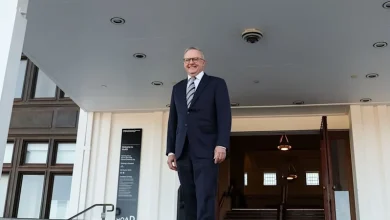$37 billion wiped off Australia in bloodbath

Global stocks are dropping sharply today — with Australia copping a $37 billion blow — dashing hopes that US President Donald Trump’s signing of a spending bill to end a record government shutdown might calm jitters through the global economy.
Politicians in Washington voted to end the 43-day stoppage that closed key services and suspended the release of data crucial to gauging the state of the world’s top economy.
But the main exchanges in Europe and on Wall Street were down across the board, following modest gains in Asia earlier.
“While it’s unclear whether the shutdown was ever a real drag on equities — given that stocks largely rallied through it — the question now is whether the market’s recent exuberance has run its course,” said Fawad Razaqzada, market analyst at StoneX.
This all comes as Wall Street’s dreaded “fear index” spiked on Thursday as US stocks slid deep into the red amid a broader AI-driven sell-off.
Shares in market AI darling Nvidia — the world’s most valuable company — plunged 3.6 per cent on Thursday’s close, while all three major indices also fell sharply.
The S&P 500 and the Dow Jones both closed down 1.7 per cent while the tech-heavy Nasdaq fell 2.3 per cent on Thursday afternoon, with Wall Street ending its worst day in over a month.
The Volatility Index, or VIX, meanwhile, was up sharply — around 20 per cent on Thursday.
Australian shares went into freefall on Friday morning, with the ASX200 following Wall Street down with a brutal 1.6 per cent plunge at the open.
That equates to roughly $37 billion being wiped off the value of Australian companies.
The VIX, known as Wall Street’s fear gauge, tracks how volatile investors expect the stock market to be over the next 30 days based on options prices for the S&P 500.
Thursday’s turmoil reflects mounting fears that the AI-led market rally may have pushed valuations too high and led to a bubble in the tech sector that could burst at any time.
“Big tech valuations and big spending will remain front of mind for investors until Microsoft, for example, can say that AI-boosted software sales have exploded — and that’s not yet the case,” said Ipek Ozkardeskaya, a senior analyst at Swissquote bank.
Mr Razaqzada said technology shares look “increasingly overvalued and overstretched” but he added it was “far too early to call a top in this cycle” as investors were still enthusiastic about AI.
Peter Cardillo, chief market economist at Spartan Capital Securities in New York, told Reuters, “There’s a lot of uncertainties about the state of the economy … What we’re going through is a little bit of a correction in the market in the AI sector and we’re seeing market rotation.”
Nvidia’s plunge came after Softbank chief executive Masayoshi Son, one of tech’s most-watched investors, revealed on Tuesday he quietly sold off all his Nvidia shares worth $US5.8 billion.
The chipmaker is due to report its latest quarterly earnings next Wednesday in what is expected to be a make-or-break moment for the bull market.
MORE: Where world’s richest men really hide their billions
Prominent investor Michael Burry of The Big Short fame now counts among the AI sceptics, after it emerged last week he had made a huge bet that the share price of Nvidia would fall along with Palantir, another major AI firm.
“Sometimes, we see bubbles,” Mr Burry wrote in a cryptic social media post last month. “Sometimes, there is something to do about it. Sometimes, the only winning move is not to play.”
Faith in the AI boom has also been rattled by a recent study by researchers at MIT that found “95 per cent of organisations are getting zero return” despite $US30 billion to $US40 billion in enterprise investment.
Not all analysts are ready to throw in the towel.
“It seems like a natural consolidation to me,” Ron Albahary, chief investment officer at Laird Norton Wealth Management, told CNBC, calling the day’s pullback “healthy”.
“Part of the, I think, AI narrative is that at some point all this [capital expenditure] is going to actually manifest itself.
“The benefits of it will manifest itself within the broader economy, so if you start seeing health care and manufacturing, industrials start to actually benefit from AI, that supports the overarching narrative, which is AI capex is going to enhance productivity across the board.”
Investors had sought a boost after lawmakers in Washington voted to end the 43-day government shutdown.
“While it’s unclear whether the shutdown was ever a real drag on equities — given that stocks largely rallied through it — the question now is whether the market’s recent exuberance has run its course,” said Mr Razaqzada.
London was pegged back after data showed the UK economy slowed in the third quarter, dealing another blow to the Labour government ahead of its annual budget this month.
Investors are bracing for long-awaited reports that have been held up by the closure of vital services in the US — particularly as the Federal Reserve assesses whether to cut rates next month, as is widely expected.
However, the White House said figures on jobs and consumer prices for October were not likely to be released as statistics agencies had been unable to collect the necessary data.
Oil prices advanced after plunging around 4 per cent on Wednesday following OPEC’s monthly crude market report, which forecast an oversupply in the third quarter.
Easing tensions in the Middle East and increased output by OPEC and other key producers have put the commodity’s price under pressure.
Big Short star’s huge move
Mr Burry, the investor who gained fame after being featured in The Big Short — the film about the 2008 financial crisis — has closed his hedge fund Scion Capital amid growing Wall Street concerns about inflated tech and AI valuations.
According to the Securities and Exchange Commission (SEC) database, Scion Capital was listed as “terminated” earlier this week.
Mr Burry had recently placed billion-dollar bets against software company Palantir and semiconductor giant Nvidia, as market specialists increasingly worry that AI-related stocks have become overvalued, potentially creating a dangerous bubble.
These concerns are amplified by mounting questions about whether tech giants can sustain the enormous costs of competing in artificial intelligence.
“My estimation of value in securities is not now, and has not been for some time, in sync with the markets,” Mr Burry wrote in an October 27 letter obtained by multiple US media outlets.
Mr Burry first made his reputation by correctly predicting the 2008 subprime mortgage crisis, when a US housing bubble nearly collapsed the global financial system.
His story was immortalised in Michael Lewis’s bestselling book and the subsequent film adaptation, where Christian Bale portrayed the contrarian investor.
Since 2008, Mr Burry has repeatedly warned of new speculative bubbles, though his predictions haven’t always materialised.
Dale Gillham, founder and chief analyst at Wealth Within, warned that if Mr Burry is right, the fallout could devastate the retirement savings of millions of Aussies.
Mr Gillham said that the problem for Australian workers is that their super funds have become increasingly concentrated in the very same US tech stocks that Mr Burry is shorting.
“Australia’s $4.3 trillion superannuation system is far more exposed to US markets than most people realise,” Mr Gillham said.
“Roughly 20 per cent, or about $800 billion, is invested in American companies, with many of them concentrated in the same overhyped AI sector that Burry is now shorting.”
— with AFP
Read related topics:Donald Trump





